Rick Wayne's Blog, page 35
October 25, 2019
(Art) The Old Gods of Ömer Tunç
[image error]
For those who don’t know, there is a recent trend in fantastic art so pervasive that it cries out for an explanation, and probably its own genre. I’ve written before about why it’s such a departure from earlier modes and what it might say about us, and I urge you to read that if this kind of art interests you at all. I’ve also posted an update, since this work continues to be produced at an amazing rate.
Turkish artist Ömer Tunç has alone produced numerous images.
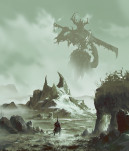

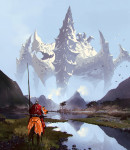
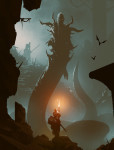

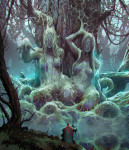


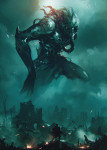
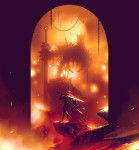


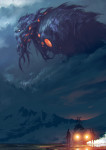






October 24, 2019
October 23, 2019
(Feature) How to Write Great Natural Magic in Fantasy
There are all different kinds of magic of course, but in fiction there are generally two:
Machine Magic is usually part of a system where a certain outcome is more or less guaranteed as long as one faithfully repeats prescribed steps. Often this magic is imbued in an object that basically works like a piece of advanced technology. It may have to be “powered,” for example, or it may require specialized training to operate, but as long as the right conditions are met, the object and/or spell will produce basically the same result every time, or in the case of LitRPG, will do so with a defined probability. See Harry Potter or the fantasy of Jack Vance.
Natural Magic (I’m tempted to call it Stochastic Magic) is not part of a system. Here, outcomes are fantastical and they happen, or don’t, for largely inexplicable reasons, like the acts of nature or the whims of the gods. Natural magic can include machine-like objects — The Mystical Mirror of Elmer which returns a loony vision to all who gaze into it — but such things, if present, are often corruptible and/or yield ambiguous or uncertain results, like the casting of lots or the cryptic warnings from the spirit in the crystal ball. See the works of Neil Gaiman.
Obviously there will be overlap, and there’s nothing that says a work of fiction has to conform to one or either of these, but generally speaking, most fantasy novels employ magic that emphasizes one of these two categories, even if it includes elements of the other — or something else entirely. The movie Dragonslayer is an artful example of a mixed approach that emphasizes the natural.
It’s probably clear that I generally prefer the latter, which necessarily puts more emphasis on character — although machine magic certainly doesn’t rule it out. Machine magic does, however, put more emphasis on action, which is why it’s used exclusively in the Doctor Strange movie, where, from the audience’s point of view, there is very little difference between Strange’s tricks and Tony Stark’s. (In the last Avengers film, Tony “conjures” a protective suit for Spider-man basically out of thin air.)
As a pure audiovisual narrative, film relies on what it can show, and machine magic is easier to show than natural magic because it follows deducible rules. You explain it simply by showing it in action. Machine magic is also easier to write when there is any kind of combat, which is why something like it is necessary in gaming: one can arbitrate a result very clearly. One simply follows the rules. To defeat the evil wizard, find and destroy his horcruxes.
Incidentally, this is why there are so many “chosen ones” in fantasy, young adult fantasy in particular. Since young adults are just exiting the home, where they were special, and entering the wider world, where they are not, there is a natural preoccupation with fitting in. A primary function of young adult literature, then, is to make the hero, and therefore the reader, seem special. If magic and magical objects work like machines, what’s to keep anyone from wielding them? A global restriction must therefore be introduced: only the chosen one can lift the magic hammer.
Natural magic is much trickier to write well. After all, if magic has no system, no rules, if it acts inexplicably to save your characters at the last second, then were they ever really in any danger?
In literary terms, this is deus ex machina, “the god from the machine.” Although the phrase is Latin, it comes from the Greek and refers to the penchant in Greek theater for dramatic tension to be resolved suddenly and inexplicably by the appearance of a god, whose portraying actor is propelled onto the stage by a machine — a crane or a riser — either to save the characters or to exact a terrible revenge.
For the Greeks, this was not a cheat. The narrative conventions of the time dictated that drama had to deliver a moral message — hubris leads to downfall, for example. Having illustrated that lesson through the plot and delivered the main character to his doom, the god appears as the agent of divine order.
These days, of course, we view such devices skeptically (in all genres but comedy, where one expects the absurd), which is why Gaiman’s “Ocean at the End of the Lane” ends so disappointingly. The goddess who was mortally wounded in the previous encounter inexplicably returns to full glory and saves the main character from the otherwise indestructible magic-eating monsters, leaving the reader with the impression he was never really in any danger at all.
Of course, characters aren’t only inexplicably saved by natural magic. They can also be inexplicably doomed by it. But if so, the story is probably a horror — where, even if the surviving characters discover the dream-monster’s secret weakness, it always roars back to life after the credits to torture more people in the sequel.
I said natural magic has no system, but that doesn’t mean it’s random. There is often an implied sympathy. In horror, for example, it’s the characters with some kind of moral failing who fall victim to the demon first. Even though there’s no “rule,” there is a reason why they can be eaten very easily while the others can fight back: the early victims are either too weak to stand alone and/or unwilling to stand with others.
In “Lord of the Rings,” only the innocent and noble Frodo can carry the One Ring. Everyone else is corrupted by its power — again, not because of a system that says as much. Simply because of the faults of their character.
This is how natural magic works well in fiction, by creating balance. Frodo can carry the ring by virtue of being innocent and noble, but in being burdened with it, he is plagued with both trauma and enemies, who seek him constantly. Indeed, the ring is constantly trying to betray him and using its power immediately brings his enemies to him.
This is how we avoid deus ex machina. An author simply has to balance any gain with a loss elsewhere. For example, she might “pay it forward” by having her novice wizard attempt a certain spell several times early in the book only to see it fail inexplicably each time, leaving the rest of the party to find another means of escape. Of course, it stands to reason that after so many tries, the hapless fool is bound to get it right sooner or later. So it is at the end, when all hope seems lost, the spell not only works but works more powerfully and wonderfully than anyone expected. The audience can accept the sudden, basically inexplicable success because it’s been bought on credit by the earlier failures in the same way that Frodo’s ability to carry the ring is matched by the torments it brings him.
This is “balancing” at the level of the character. One can also balance at the level of the book. Characters can fall inexplicably as long other are raised inexplicably as well. George R. R. Martin employs something like this in “A Song of Ice and Fire” (known widely as Game of Thrones). Because so many characters die basically at random, readers can accept the occasional inexplicable good fortune. It seems “fair” that if the one happens, the other will sometimes as well. Dramatic tension is preserved because in any encounter, readers will never know which way events will turn.
It’s important to note that this “balancing” doesn’t have to be 1:1. It’s not magical accounting, where every debit is matched by a credit — although you could write that if you wanted to. Natural magic is also not LitRPG, where a spell has a certain probability of success determined by the roll of a die.
But just because there’s no system doesn’t mean natural magic acts “without reason.” As an author, you must create a sense of balance or wholeness, which creates a sense of fairness, such that your readers are swept through the story naturally without stopping to tally merits and demerits incredulously. And to the degree you can write natural magic as an extension of your characters’ agency, of their unique weakness or potency as human beings, it can be much more personal and magical than, say, a final lunge to reach the amulet that anyone can use, or yet another story about a chosen one.
October 21, 2019
(Fiction) The bunny comes or I scream
I woke around noon to find a strange man standing over me.
I shrieked and fell backward to the floor between the bed and the wall, claws up, ready to scratch the fucker’s eyes out. But he just stood there, hands at the sides of his black suit, while his companion, a tall, thin black man with narrow sideburns, checked the closet and bathroom and under the bed.
“She’s not here,” he said. “But the window in the bathroom is open.”
The man in the suit had a bulbous metal object in his hand, like a vajra or two-sided scepter. He slipped it into a holster under his coat—a holster for a spiritual object—and looked to me like he was waiting for an explanation.
“I took a dump this morning,” I said. “I didn’t want to stink up the place. You’re welcome, by the way.”
“Check outside,” he ordered the man with the narrow sideburns, who nodded briskly and left.
My interrogator bent to pick up one of the boxes of cordials from the floor. There was a sticky cluster of empty chocolate shells inside. He counted the number of boxes around the room.
“. . . three . . . four . . . five.” He looked at me.
“I got hungry,” I said.
He tossed the box in the trash. The skin of his cheeks was pockmarked and his hair was pomaded. He looked like door security for a pay-by-the-bottle club in Midtown. He even had the requisite merino turtleneck in place of a shirt and tie.
“Put some clothes on,” he said flatly. “Mr. Raimi would like to see you.”
I looked down. I was in nothing but a Care Bears T-shirt and granny panties. “Who?” I feigned.
Bouncer-man was not amused.
“What happens if I tell him to go fuck himself?” I asked. “Or you. You look like someone who takes it up the ass.”
“Trust me.” He picked up my jeans from the floor and tossed them to me. “It’s in your best interest to come.”
“Is that a threat?”
I slipped them on and went to pee. I leaned against the wall for a moment and let my heart calm down. At least I wasn’t about to be gang raped.
“Fuck, Kell . . .”
I stuck my head out the window across from the toilet. The man with the sideburns was at the end of the alley. No escape that way. I waved and smiled and shut the window. At least she got away. I figured the best thing I could do for her was lure them away as quickly as possible. I peed and put my hair back and skipped my face and teeth. When I stepped out, my chaperon was waiting by the door. I swiped my aviators off Mr. Fluffers, who sat in a chair.
“Ready,” I said.
“Don’t you need this?” Bouncer-man lifted Kell’s purse and dug through it.
“Excuse you. That’s mine.”
He found the mace and threw it in the trash. Then he handed to purse to me. “Get in the car.”
I slung the purse over my shoulder. It was heavy. Damn, girl. No wonder your arms are toned. Then I grabbed Mr. Fluffers and carried him under my other arm.
“Is that really necessary?”
“The bunny comes or I scream.”
Bouncer-man and sideburns took me uptown via high-tech limo. They sat up front. Mr. Fluffers had his own captain’s chair. There was a large touchscreen panel in the back that controlled the temperature and the music and the WiFi and the privacy window and everything. Four of the seats had their own foldout screens, like on an airplane. I spent the whole ride rolling the windows up and down and streaming parts of various TV shows I’d never seen.
We stopped in front of an old stone-block mansion, more tall than wide and wedged carefully between a pair of brick condo towers. Bouncer-man got out and told me Mr. Fluffers would be waiting for me when I got back.
“Don’t hurt him,” I warned.
Bouncer-man walked to the front door as the limo pulled away, leaving me alone on the sidewalk with a bald man in an impressive coat.
A coat. In June.
Still, I can see why he was so fond of it. It was awesome. It was an old-style chuban, like they used to wear on the mainland centuries ago, only the buttons had been replaced. These were all different. One was stamped metal. Another was polished amber. Whatever had been printed on the fabric had long-since faded to wisps. Now it appeared as an early morning fog, or maybe smoke from a campfire. He wasn’t particularly tall, but he wasn’t particularly short either. His skin was an odd color—it had a faint ocher hue—and he was completely bald. He was staring up at the house like the roof was on fire. So I did the same.
The mansion’s first three levels were obviously part of the original structure. The block stone had dark runoff stains at the edges of the gutters that spoke to old age. A huge bay window jutted from the second and third floors, suggesting there was a single tall space behind, like a ballroom or long dining hall. The top floor was a later addition, although the architect had done a good job of blending the styles. The front of it was all windows, but they were tinted and impenetrable.
“Ms. Song,” Bouncer-man urged me from the front door.
“Yeah, just a sec,” I said with my neck craned at exactly the same angle as my odd companion. “What am I missing?” I asked.
He turned to me then with a curious gaze, like he was utterly amazed I was even aware of his presence. Come to think of it, no one else so much as glanced at him.
“Dig the coat,” I said.
“Ms. Song,” my chaperon repeated. “Now.”
“Yeah, yeah, I’m comin’.”
Pretty sure the bald guy watched me in silence as I went in. I stopped in the middle of the foyer.
“Wow. Never been in a house with its own elevator.”
“Mr. Raimi is waiting,” he said, urging me to the grand staircase that curved around both sides of the glass-walled shaft.
I followed him up. The steps were shallow and wide and covered in soft carpet, like something out of a really nice hotel. The two sides of the staircase wound like DNA strands around the elevator, which opened both ways. On the second floor, it opened toward the front, but since that’s where the stairs met on the third floor, there it opened at the back. The steps alternated randomly between the same four colors.
“Is he in biotech or something?” I asked.
“Mr. Raimi has lots of businesses.”
The fancy stairs stopped at the third floor, confirming my suspicion that it was the original top, and I was led down a hall toward the steps to the fourth floor addition. We passed several open rooms on the way. They were opulently wallpapered but empty. One didn’t even have drapes over the windows.
I stopped. The last door on the left of the long carpeted hall was cracked open, as if someone had just been inside, and I caught sight of a canopy bed, unmade, and a mess of clothes and crap. I pushed it open. By the state of it, it had to be Kell’s room. To my left was a private bathroom with an oval tub and a glass-walled shower with built-in tile seat and two shower heads, one on each side. The tub had jets—of course—and sat next to a window with a view of a courtyard below, like a little garden.
Bouncer-man reached past me and shut the door to the room. Then he took my arm, gently but insistently, and led me back to the stairs. He made me go first this time, and as I climbed to the top, I wondered what it was like to live in this house every day. The butler guy was also a pretty good chef, from what I understood, and she could just call down and say “Make me some sandwiches!” and he’d bring up a platter with a selection: one open-faced with seared ahi tuna, one with imported Black Forest ham and aioli on lightly toasted brioche, and one PB&J.
Okay, I made all that up, but that’s what it seemed like.
The top level definitely had a mid-century, Frank-Lloyd-Wright-y feel. The stairs were a single set of simple planks that jutted from the wall with open air between. The railing was solid glass. There was a waterfall in a nook at the top, near where the elevator exited, and a library-office straight ahead, which is where I was directed.
I stepped into the room, which was empty.
“Wait here,” bouncer-man said.
The formal desk was on the right side of the room so that sitting behind it, you had a clear view of the windows, the door, and the boardroom table at the other end. Interestingly, the desk was missing a chair. Over it hung a five-foot-tall portrait of a young man with brown curls standing before a bleak wall of chiseled rock. He rested an arm on it the way you might lean against a fireplace mantle. In the middle of the long room was a fancy couch and matching armchairs. Everything smelled like new carpet—nice new carpet, too. Not that stinky acrylic crap. The view out the windows was killer. You could see part of the skyline. I looked down to the sidewalk, but the bald man was gone.
Spaced evenly along the oak-paneled walls were ornate framed pages from old manuscripts. I browsed as I waited, moving around the antique occasional furniture. I was studying a very large parchment, like a poster, when Lykke rolled in. Or at least I assumed it was him. We had never actually met. But it was the same man as in the painting, just a lot sicklier. He was tall, which I’d been told, but he was confined to a wheelchair, which I had not, which suggested it was a recent development. He wore a loose padded house vest over a collared shirt. On his feet were leather slippers.
I beat him to the punch. “I told your guys like twenty times on the way over that I don’t know where she is, so if that’s why I’m here, it’s a gigantic waste of everyone’s time.”
“How do you like it?” he asked, a smidge out of breath.
He was younger than I expected. I mean, I already knew he wasn’t that old, but in person he seemed barely older than me, which made me angry—that someone so young could have so much money, that a half-furnished mansion like that wasn’t even his primary residence, just the place he crashed when he was in town. He nodded to the page in front of me. Most of it was handwritten text. The scratch was so old that the once-black ink had faded to pale brown. Some of the letters were all but invisible, to the naked eye anyway. I knew from school that you could resurrect stuff like that with infrared imaging, and that they often found older texts underneath visible ones.
“It’s from the eleventh century,” he explained with a little bluster. “Nearly a thousand years old.”
If he had an accent, it was faint enough for me not to catch it. But then, I don’t always with non-native speakers.
“Is that when the eleventh century was?”
Most of the framed pages were walls of indecipherable text with little hand drawn diagrams, but the sheet in front of me was a full-page illustration. A naked man, crudely drawn and out of proportion, stood under a gallows. The rope that had held him had snapped and part of it dangled from the wood. He held a flaming staff and there were symbols all over his body that matched those in the circle on the ground around him. Three long knives, each different than the other, poked up from the foreground.
Lykke pointed to the symbols. “Remind you of anything?”
I squinted. The UV-protective glass preserved the document inside but made it a little difficult to see with the glare from the big windows behind me.
“Sort of looks like a circuit diagram.”
There were zigzags and T-junctions, all of which ended in a small circle, just like you’d see on an electrician’s layout.
“People forget that modern science grew directly out of alchemy,” he explained. “Properly understood, there’s no difference.” He motioned to the pair of chairs in front of the desk. “Please have a seat.”
I stood in place. “This is kidnapping, you know that right? According to the good detectives of the SVU, you’re looking at 20 long.”
He tossed his phone to me with a smirk, as if urging me to call the police. I caught it, but I just as easily could’ve missed. It was the latest model. Very light. Very slim. And there was no case, as if to underscore that he was rich enough not to care.
I made a face and laid it on the desk as he slid some files from the top into a drawer. When it shut, I heard a slight rattle, as if from a bottle of pills. Or three.
“Please. Sit,” he repeated.
I ignored the chairs by the desk and walked to the couch. It was soft and I sank in comfortably. I put Kell’s purse on the seat next to me and my flower-print Keds on the coffee table and made myself at home.
“Fair enough.” He rolled over to me, grabbing his phone on the way. His hands seemed a tad too small for his body. “How was your trip to Coney Island?”
“Good, actually. I had never actually been. It’s one of those things you always say you’re going to do but then never do. But now I did, so we can scratch that one off the bucket list.”
“By yourself?”
“I figured you were busy.”
He smiled. “We haven’t met before. Have we?” He extended his hand.
I ignored it. “I’m sure I would’ve forgotten.”
“You’re the best friend.”
“So she tells me. But I have my doubts.”
“You’re not an easy person to find.”
“Seems like your guys did alright.”
“But you’re not where the government thinks you are, are you? Do you even have a lease with the Arab or is it all under the table?”
“The Arab? His name is Abdul, thank you. And since you seem to know everything, you tell me.”
He took out his phone and read the screen. “Ce-Lei-Zi Song. Hong Kong native. Granddaughter of Wai-Ling Lau, a local restaurateur of some renown, it seems. Merit scholarship out of high school to the Bruxton School.” He glanced to me. “Impressive.”
I shrugged.
“Dropped after your second year, shortly after being arrested for assault?”
He glanced over me again. I think the idea was that I’m hardly big enough to assault anyone.
“I’m scrappy.”
“Charges were dropped. Second arrest for vandalism a few weeks ago. Charges pending.” He put the phone back in his vest pocket. He was breathing just a little too hard. And there was a bulge underneath the skin of his neck near the back of his skull. “Still here on student visa. How’s that work?”
USCIS hadn’t quite figured out that I’d quit. I might have encouraged that misunderstanding.
Lykke nodded to bouncer-man, who was standing silently off to one side, and the man slapped a stack of cash on the coffee table hard enough to shake the glass. It was brand new, by the looks of it. Even the little paper band around the middle was crisp. The label had a bank logo and said $10,000.
I sat up. I’d never seen that much money. I took it and flipped through the bills. They were stiff and had the pleasant feel of fine stationery. The smell of fresh cash hit my nostrils.
“Damn,” I said with a snort. “Now I know why rappers are always making it rain.” I sniffed again. And again. “Fuck. Someone should bottle this.”
“I believe they’ve tried.” He sat back, smirking. “You know, I was never cool like you and Kelly Ann. But then, that’s probably very clear.”
I set the cash back on the table.
“I didn’t go to a party until I was in college. By then, it seemed everyone else already knew what to do. How to behave. I felt so awkward and left as soon as I could.”
“Is that your excuse for kidnapping? You’re too much of a dweeb to know better?”
“I just want what’s best for Kelly Ann. Did she tell you what happened?”
I shrugged noncommittally. “Haven’t seen her.”
He smiled again in that casually amused way and leaned back. “You don’t have to lie, Cerise. We’re on the same side. I promise.”
“I’m not lying,” I said as earnestly as I could. “Until your goons showed up, I thought she was still crashing on the princess bed downstairs. So what happened? You hit her or something?”
He stiffened a little then. “Ah,” he said, as if everything was suddenly clear. He thought for a moment. “The only reason I sent William”—he motioned to bouncer-man—“to fetch you was because this meeting is urgent. I’m going out of town again this afternoon and I was sure you and I would want the same thing.”
“Which is?”
“To help Kelly Ann.”
I reached for the cash and flipped through it again. It was so much denser than I expected. Like it could stop a bullet.
“That what this is for? To buy my ‘help?’”
“No,” he said with a half-annoyed grin. “The money is for your trouble. And any expenses you might incur.”
“Expenses?”
“You’re unemployed, aren’t you? Call that a gift. From a friend of a friend.”
I tossed the money to the couch. “No thanks.”
“Kelly Ann trusts you,” he said. “You might be the only one, actually.”
“I doubt it.”
He looked at me seriously, as people do when sarcasm stops being funny. “William, will you give her the book, please?”
Bouncer-man retrieved a scrapbook from the desk. It had a padded, brightly patterned cover, like something you’d buy at a university bookstore.
I took it. “What’s this?”
I opened to the middle. Both pages were full of overlapping magazine clippings of models and couture fashion. I hadn’t seen the book before, but the implication was clear. It was Kell’s, which irked me—that I didn’t know it—and I slammed it shut.
“I’m keeping this,” I said.
I stood and lifted her purse.
“What about her ex-boyfriend?” he asked sternly. “The one with all the rings.”
“What about him?”
“Surely you don’t have any loyalty to him. After what he did.”
I shrugged. “Not really. Why?”
“Any idea where we can find him?”
He thought Bastien would be Kell’s second stop. He was probably right.
“You got your way, rich boy. I came. I listened. Next time, I’m pressing charges.” I started for the stairs.
He stood from the wheelchair. I couldn’t see it but I heard it. I got the sense it was a struggle.
“How much?” he called.
I just shook my head and kept walking. Bouncer-man stepped forward like he was going to block me, but Lykke stopped him.
“No, William. Cerise!” he yelled. “Please, you’re not being creative.”
I stopped. It was a helluva thing for a monied douche like him to say that to an artist. I tried to come up with an absolutely devastating reply, but it took half a second too long.
“There must be something you want,” he said. “Use your imagination. If not for yourself, then a large donation to charity perhaps? Save the environment or something. Or perhaps an endowment for young artists. Once word gets around, people all over the city will take note of your art. You’ll be making it on your own steam in no time, with no debt to me.”
“Dude.” I laughed. “Maybe this is news to people like you, but you can’t buy a friendship. Okay? It’s not even a question of money.” My mouth hung open as I searched for a better explanation. Not having one, I just shook my head like my brain had short-circuited from the nonsense. Bzzzt.
“I’m not asking you to betray your friendship,” he said.
“Whatever’s going on between you and Kell is her business.” I started to leave again.
“Jesus, Cerise, just tell me what you want.”
It was the way he said it—so quick and so loud, like he was just throwing words at me, like he hadn’t actually listened to a single thing I’d said, like he was convinced everything truly was for sale and I was simply being a petty little thing, too much of a coward to own up to whatever it was I really wanted, that I was nobody and how dare I stand in his way.
“A million dollars,” I joked without breaking stride. “In non-consecutive, unmarked bills.”
Isn’t that what they say on TV?
He paused. “Okay. Deal.”
I went to flip him off from the door, if only for making a joke of it. But then I saw his face. He wasn’t joking. At least, he didn’t seem to be. He was back in his chair, looking down at the carpet with a scowl as if contemplating how to pull it off.
“It would take a few days,” he said. “An instrument other than cash would make it considerably easier.” He leaned with a grunt and lifted the ten grand from the cushion. “The United States government is very particular about large withdrawals. But then, something tells me bonds aren’t an option.” He snorted at his own joke.
Ass.
“I’ll need assurances from you,” he said flatly. “Guarantees. For that much money, I need to know you can deliver.”
“Wait.” I stepped back into the room. “You’re gonna give me a million dollars to tell you where Kell is.”
“No,” he corrected. “I’m giving you a million dollars to find the child she’s carrying in her womb. As I understand it, it’s a package deal.”
“So get a private detective. As I understand it,” I said, mocking him, “a good one won’t cost you anywhere near a mil.”
“You’re funny,” he said looking down, like he was talking to himself. “You think I came to you first.” For a moment, it seemed like he was fighting back a cough. “I’m not proud of my behavior, Cerise, but let’s not pretend we don’t know what she’s like. Time is critical. Kelly Ann is distraught. Understandably. And my doctor tells me the first few weeks are vital. We need to find her before she does irrevocable harm. Crack. Or meth. Or whatever the cool kids are doing these days. She trusts you. Implicitly.” He nodded to the scrapbook in my hand. “You know her hangouts, her friends, where she buys her drugs. You think any of those people are going to open up to some burly PI? Would you?”
No.
“I’ll find her, of course,” he said. “It’s just a matter of how soon. I’d rather one of her friends profit from it than a stranger.” He paused for emphasis. “I’m not the bad guy here, Cerise. I’m just trying to save my child.”
I was scowling in disbelief. “A million dollars,” I repeated, incredulous.
He nodded. “In nonconsecutive unmarked bills. That was the order, correct?”
I nodded absentmindedly.
He shuffled over and held out a hand. “So. Does that mean we have a deal?”
October 20, 2019
(Art) The High Pulp of Ji Hun Lee
The works of Korean artist Ji Hun Lee have appeared in numerous games, and I can see why. While his style is recognizably Eastern, especially in the faces, it is also reminiscent of the colorful realism of the classic pulp artists. (I also appreciate that he doesn’t over-sexualize his women, which unfortunately is still the norm in Asia.)
Find more by the artist on his DeviantArt page.


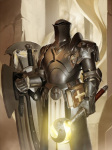


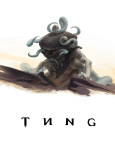








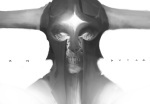
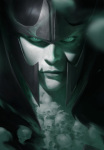
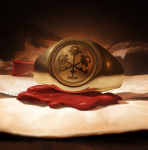
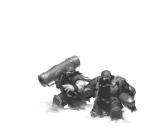
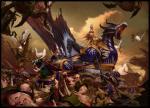
October 18, 2019
(Feature) If you only read one book, read one that isn’t true
[image error]
A connection of mine recently self-pubbed a cyberpunkish dystopian sci-fi novel. Since I’m universally supportive of gatekeeper-free publishing, I was enthusiastic at first, but it’s since turned out to be little more than a thinly-veiled political diatribe in which a noble loner resists a state collectivization scheme.
Now, I don’t share that brand of parochial ideology, which I’m sure contributes to my distaste, but I also don’t care for that kind of fiction generally. Earlier this year, I stopped watching the BBC mystery Unforgotten because it made a hero of the benevolent state to the point that all the social conservatives were villains. It’s fine, I guess, if you’re a wide-mouthed nestling who likes your views regurgitated back to you, but I don’t.
Any creator’s point of view can’t help but inform their art, of course — especially narrative art, which must impose a story on the chaos of the world — but there is a genuine difference between telling a story from your point of view and asserting your point of view through story.
I am not Christian, but I love C.S. Lewis’s “The Screwtape Letters,” which is a fictionalized account of the Anglican world view. In it, a demon — the eponymous Screwtape — writes a series of epistles to his nephew, Wormwood, a novice tempter. Like the letters of Paul, we never see the replies, but through Screwtape’s successive advice, a story unfolds of the humble human Wormwood is supposed to lead stray, along with a wonderful description of Anglicanism “in reverse” — that is, as it is seen by the forces of darkness.
By the end of the book, faith certainly comes out of the bath smelling sweet. It saves the man in question from temptation and Screwtape turns on his own nephew. But in reading the book, one feels merely that Lewis has opened a door, not that we’re obliged to walk through.
There’s value in such things, in seeing the world from a different point of view. One does not have to be (or become) liberal to appreciate “Beloved” or “A Handmaid’s Tale.” In fact, those whose lives are furthest from the experiences described will likely have the most to gain.
Novels, like any art, can exist as both subject and object. The paradigmatic art-as-object is the print advertisement, which often includes illustrations or logos or elements of design — which we call art. Professional artists like Banksy make a living defacing and denigrating advertisements, especially billboards, but what they’re objecting to is not the art, and rarely even the message, as much as the unquestioned belief that public spaces should be for sale.
But time leaches all advertisements of their commercial content. Those from the 19th century or the art nouveau period are framed and hung on walls these days, meaning they have ceased to be art-as-object and have become — however weakly — art-as-subject.
Good novels, novels that are art-as-subject, describe an experience. Bad novels, art-as-object, prescribe one. They want you to buy something, or at least buy into it. They are worse than advertisements in that, when you are looking at an ad, at least you know you’re looking at an ad. We feel cheated when something that is not supposed to be an ad turns into one — as in the classic scene from the movie A Christmas Story, when Ralphie locks himself in the bathroom to decode a secret message. He expects a thickening of the plot only to discover an Ovaltine pitch.
“1984” and “Lord of the Flies” and “The Screwtape Letters” and “A Handmaid’s Tale” describe a certain world from a certain point of view. They invite us to walk around and see what it’s like there. My shabby novels aim for far less. The world they invite you to explore is merely a fantastical one.
A good novel bends the message around the reader in this way. A bad novel bends the reader around the message. When what it “sells” is a political view (versus, say, a specific candidate), we don’t generally call it an advertisement. We give it a different name: propaganda.
When Picasso painted his Guernica, he was reacting to the horrors of the Spanish Civil War, so there is a certain sense in which it is an “anti-war” painting. But there is a difference between Guernica and a Vietnam-era protest poster. The painting merely opens the door on the experience of the town of Guernica, which was casually bombed by the fascists. It is anti-war without becoming propaganda in the same way that “The Screwtape Letters” is pro-Christian without becoming a sermon.
That distinction — between art and propaganda, between having a point of view and selling it — might seem academic, but it matters. In fact, the ability to tell the difference might matter more now than in the recent past because today we are surrounded by ideologues who label everything they don’t agree with as “fake.” We’re told entire media outlets, from The New York Times to FOX News, are best avoided because they’re biased, by which is meant propaganda.
This is not merely wrong, it is pernicious. If the mere presence of a different point of view is your litmus test for propaganda, then you immediately rule out any experience but your own — the scientific equivalent of discarding or explaining away any observations that don’t fit your theory.
We should all read widely. We should all think widely. That includes points of view that appall you.
October 16, 2019
Peter Blume (1906-1992), The Rock, 1948. Via: https://bi...
[image error]
Peter Blume (1906-1992), The Rock, 1948. Via: https://biblioklept.org/2019/10/03/the-rock-peter-blume/
October 15, 2019
(Art) The Holy Horror of Mike Franchina
Blending dieselpunk, medieval horror, and dark metal fantasy, Costa Mesa artist Mike Franchina has created an alternate earth where Catholic forces are locked in a never ending paranormal trench war with the armies of hell. He includes a short description with each character, only a few of which I’ve included below. You should go check out the full collection on his ArtStation page. Or better yet, support him on Patreon.
Trench Shrine
The trenches are considered sacred ground, where the armies of the Church defend against the attacks of the heretics. This Mk. 2 “Seraphim” shell, was blessed by a saint, and given a place of special reverence.
[image error]
Trench Pilgrim
A holy warrior of the trenches. Considers it his religious duty to make pilgrimage to the sacred battlefields to fight the heretic legions. He wears the iron capirote to insulate his mind from the horrors of war.
[image error]
Lord of Tumors
A high ranking officiant in the Cult of the Black Grail, the Lord of Tumors spreads filth and corruption amongst friend and foe alike.
[image error]
Sniper Priest
Sniper priest: blind themselves ritually as a devotion to god, and use only their faith to strike the enemies of the Church. During the Siege of St. Lux stories were told of a sniper priest killing a target 3 miles away.
[image error]
Procession of the Sacred Affliction
The members of the Procession of the Sacred Affliction purposefully contract leprosy as a form of flagellation. The disease has been passed down from the founder, and is considered a holy disease.
[image error] [image error]
Larval Beast Lord
Depicted here in the moments before the destruction of St.Lux. The Larval Beast Lord seen here is still in its infancy, only one has ever been glimpsed when fully grown, and the recon element that sighted it did not survive.
[image error]
Paladin of the 3rd Circle
A holy warrior of unparalleled might. Descends into Hell to slay demons within their places of power. Bred from the genes of Christ and trained from childhood in the arts of war.
[image error]
(Art) The Holy Horror War of Mike Franchina
Blending dieselpunk, medieval horror, and dark metal fantasy, Costa Mesa artist Mike Franchina has created an alternate earth where Catholic forces are locked in a never ending paranormal trench war with the armies of hell. He includes a short description with each character, only a few of which I’ve included below. You should go check out the full collection on his ArtStation page. Or better yet, support him on Patreon.
Trench Shrine
The trenches are considered sacred ground, where the armies of the Church defend against the attacks of the heretics. This Mk. 2 “Seraphim” shell, was blessed by a saint, and given a place of special reverence.
[image error]
Trench Pilgrim
A holy warrior of the trenches. Considers it his religious duty to make pilgrimage to the sacred battlefields to fight the heretic legions. He wears the iron capirote to insulate his mind from the horrors of war.
[image error]
Lord of Tumors
A high ranking officiant in the Cult of the Black Grail, the Lord of Tumors spreads filth and corruption amongst friend and foe alike.
[image error]
Sniper Priest
Sniper priest: blind themselves ritually as a devotion to god, and use only their faith to strike the enemies of the Church. During the Siege of St. Lux stories were told of a sniper priest killing a target 3 miles away.
[image error]
Procession of the Sacred Affliction
The members of the Procession of the Sacred Affliction purposefully contract leprosy as a form of flagellation. The disease has been passed down from the founder, and is considered a holy disease.
[image error] [image error]
Larval Beast Lord
Depicted here in the moments before the destruction of St.Lux. The Larval Beast Lord seen here is still in its infancy, only one has ever been glimpsed when fully grown, and the recon element that sighted it did not survive.
[image error]
Paladin of the 3rd Circle
A holy warrior of unparalleled might. Descends into Hell to slay demons within their places of power. Bred from the genes of Christ and trained from childhood in the arts of war.
[image error]
October 14, 2019
Find it here.
One part mystery. One part savagery. Three...
[image error]
One part mystery. One part savagery. Three parts magic.
Years ago, driven by greed, men penetrated the last soft places on earth. Out of the clear-cut jungle—out of nowhere—a man appeared, eyes rimmed in blue. The last shaman. A man who could make magic.
Now a recluse, known to modern society only as an eccentric chef, he is locked in an occult battle with an unseen nemesis. Their prize: a most unusual book, penned before the fall of Babylon, said to contain the recipe for eternal night.
Across five stories, five victims of inexplicable events narrate their encounters with an enigmatic titan of magic, a man without a past, whose tattooed palms hold the power to alter human history—or to end it.
Agony in Violet
As his marriage crumbles around him, a brilliant medical scientist searches for the source of a horrific illness that leaves its victims ashen and wasted. With no apparent connections between them, his only clues are the strange symbols that appear near the bodies after death. When a child is stricken, old traumas resurface and the good doctor turns in desperation to a curious consultant, who reveals that not every labyrinth has walls, and that the horrors you face there are always your own.
Curse of the Red Dagger
A troubled young woman, pregnant with a billionaire’s baby, disappears without a trace. Determined to save his child, he offers her best friend one million dollars to find her. But following in her friend’s footsteps proves more difficult than she expected. Everyone connected to the disappearance seems desperate to hide the truth. As they each fall to mysterious circumstances, death closes around her, and her only chance to save her friend is to sacrifice herself to an ancient power.
To the White of the Bone
A mangled body floats to the surface of a reservoir with nothing to distinguish the victim save for a binding knot branded under her tongue. The case is routed to the NYPD’s resident occultist, an uncompromising homicide detective whose history of unusual and uncertain results has left her career in shambles. Dodging an inquiry into a fatal shooting and pursued by a homicidal witch, she contemplates a devil’s bargain to stop the killer, who just may be the Lord of Shadows.
The Song on the Green
One by one, the children of an upscale Pennsylvania neighborhood are found crippled and catatonic, their minds seemingly vanished. As the panicked community searches in vain for a human predator, they neglect the only witness, an eight-year-old boy with a menagerie of strays, who is left to stand alone against the very creature that hunts him.
Bright Black
After carelessly killing an innocent, a beautiful aristocrat is cursed with eternal youth. Forced to endure as waves of friends and loved ones wither and fade around her, she wanders the ages in search of meaning—from the wars of Napoleon to the Victorians in India, from the Great Depression to the collapse of the Iron Curtain. Recruited as a spy in an occult war, she soon tires of blood and loss and retreats to a small village in the mountains, where an accident reveals missing memories and an unfortunate truth: that the mistakes of five lifetimes are not so easily fled.
Part urban fantasy, part hard-boiled whodunit, FEAST OF SHADOWS is a five-course occult mystery and the most devilish meal you’ll ever read.
The complete epic conundrum will be released in two parts.



